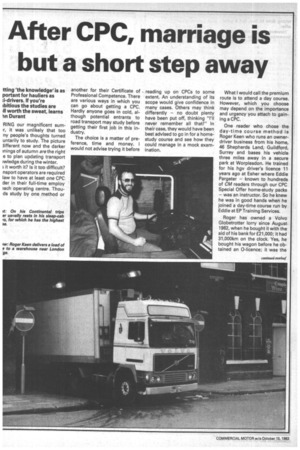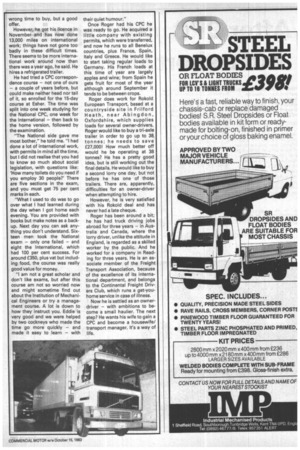After CPC, marriage is but a short step away
Page 32

Page 35

If you've noticed an error in this article please click here to report it so we can fix it.
tting 'the knowledge' is as portant for hauliers as ti-drivers. If you're ibitious the studies are
II worth the sweat, learns in Durant
RING our magnificent sumr, it was unlikely that too ny people's thoughts turned untarily to study. The picture iifferent now and the darker !nings of autumn are the right e to plan updating transport iwledge during the winter.
; it worth it? Is it too difficult? nsport operators are required law to have at least one CPC der in their full-time employ ach operating centre. Thouds study by one method or another for their Certificate of Professional Competence. There are various ways in which you can go about getting a CPC. Hardly anyone goes in cold, although potential entrants to road transport may study before getting their first job in this industry.
The choice is a matter of preference, time and money. I would not advise trying it before reading up on CPCs to some extent. An understanding of its scope would give confidence in many cases. Others may think differently — no doubt plenty have been put off, thinking "I'll never remember all that!" In their case, they would have been best advised to go in for a hornestudy course and see how they could manage in a mock examination. What I would call the premium route is to attend a day course. However, which you choose may depend on the importance and urgency you attach to gaining a CPC.
One reader who chose the day-time course method is Roger Keen who runs an ownerdriver business from his home, 46 Shepherds Land, Guildford, Surrey and bases his vehicle three miles away in a secure park at Worplesdon. He trained for his hgv driver's licence 11 years ago at Esher where Eddie Pargeter — known to hundreds of CM readers through our CPC Special Offer home-study packs — was an instructor. So he knew he was in good hands when he joined a day-time course run by Eddie at EP Training Services.
Roger has owned a Volvo Globetrotter lorry since August, 1982, when he bought it with the aid of his bank for E21,000; it had 31,000km on the clock. Yes, he bought his wagon before he obtained an 0-licence; it was the wrong time to buy, but a good offer.
However, he got his licence in November and has now done 13,000 mites on international work; things have not gone too badly in these difficult times. There seems to be more international work around now than there was a year ago, he said. He hires a refrigerated trailer.
He had tried a CPC correspondence course — not one of ours — a couple of years before, but could make neither head nor tail of it, so enrolled for the 15-day course at Esher. The time was split into one week studying for the National CPC, one week for the International — then back to the home version, followed by the examination.
"The National side gave me most bother," he told me. "I had done a lot of international work, with permits in mind all the time, but I did not realise that you had to know so much about social legislation, with questions like: 'How many toilets do you need if you employ 30 people?' There are five sections in the exam, and you must get 75 per cent marks in each.
"What I used to do was to go over what I had learned during the day when I got home each evening. You are provided with books but make notes as a backup. Next day you can ask anything you don't understand. Sixteen men took the National exam — only one failed — and eight the International, which had 100 per cent success. For around £350, plus vat but including food, the course was really good value for money.
"I am not a great scholar and don't like exams, but after this course am not so worried now and might sometime find out about the Institution of Mechanical Engineers or try a management course. A lot is down to how they instruct you. Eddie is very good and we were helped by two cockneys who made the time go more quickly — and made it easy to learn — with their quiet humour."
Once Roger had his CPC he was ready to go. He acquired a little company with existing permits, which were transferred, and now he runs to all Benelux countries, plus France, Spain, Italy and Greece. He would like to start taking regular loads to Germany. His French loads at this time of year are largely apples and wine; from Spain he gets fruit for most of the year although around September it tends to be between crops.
Roger does work for Rokold European Transport, based at a countryside site in Frilford Heath, near Abingdon, Oxfordshire, which supplies loads for several owner-drivers. Roger would like to buy a tri-axle trailer in order to go up to 38 tonnes; he needs to save £27,000! How much better off would he be operating at 38 tonnes? He has a pretty good idea, but is still working out the final details. He would like to buy a second lorry one day, but not before he has one of those trailers. There are, apparently, difficulties for an owner-driver when attempting to hire.
However, he is very satisfied with his Rokold deal and has never had a late cheque.
Roger has been around a bit; he has had truck driving jobs abroad for three years — in Australia and Canada, where the lorry driver, unlike the attitude in England, is regarded as a skilled worker by the public. And he worked for a company in Reading for three years. He is an associate member of the Freight Transport Association, because of the excellence of its international department, and belongs to the Continental Freight Drivers Club, which runs a get-youhome service in case of illness.
Now he is settled as an ownerdriver — with ambitions to become a small haulier. The next step? He wants his wife to gain a CPC and become a housewife/ transport manager. It's a way of life.






















































































































